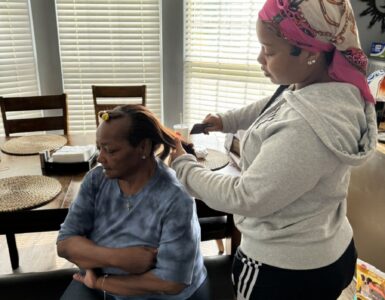By Alaina Wheeler
Mental health issues are overlooked, especially in the case of teens and children who are in minority groups. For Black Americans, the issue is especially evident. Due to economic, social and environmental factors mental health issues in black communities are often overlooked. From the lack of high quality health care to the lack of overall mental health care awareness there is not enough information. According to Substance Abuse and Mental Health Services Administration about 21.3% white women use health care services while only 10.3% of african american women use health care services.
For decades a stigma has existed in the Black community that makes it more difficult for people–especially Black teens–to seek mental healthcare. In some cases, kids are taught to be tougher than the rest.
The actress Taraji P. Henson has been an advocate for mental health care in the Black community. Her organization, the Boris Lawrence Henson Foundation, fights to end stigma on the issue. In April of 2020, she told ABC News that taking care of mental health means, “finding the right therapist, someone who understands your background.”
According to some experts, sometimes that means talking with mental health professionals who understand firsthand the issues their patients are facing. For Black students, though, that can be more difficult. For mental health experts, it can mean the challenge with reaching the right audience, making sure you are effective. For parents that can mean understanding that their children need to be heard.
William Kellibrew, the director of youth and trauma services at Baltimore City Health Department, understands that with the last year being almost completely remote that there was going to be an increase in mental and trauma services. Mr. Kellibrew addressed that black Americans may feel marginalized especially from low income communities. From being impacted the most by the unemployment after Covid-19 to the last to get vaccinated Kellibrew has seen how much blacks are disportionately represented when it comes to mental illness.
While working in the department he saw an increase in the ages of 11-24 in relation to victimization and mental health services. Mr. Kellibrew encourages that everyone try alternative therapy methods, he said “we have adopted holistic practices practices of chess yoga and mindfulness, and since then 77% of the people who have used those services say they have truly benefited from these services.” He is an advocate for not making mental health in the black community not such a taboo subject.
Professor Dr. Tyish Hall Brown, the director of School Based Behavioral Health at Howard University, has seen first hand the effects of mental health of students. Dr. Brown said that mental health issues are all-encompassing. She encourages parents, she said, “not to think of mental health as something that is separate or for crazy people but to let everyone know we all have mental health. The goal is to promote and support mental health.”
Dr. Brown works to end the stigma around mental healthcare being a bad thing. Dr. Brown explained her goal for the next year as students possibly return to campus. Drug use, relationships, dealing with Covid-19 are some of the things she hopes to discuss with students. Most importantly, though, she said she wants to give them tools to deal with stress.
She believes that since the pandemic something as simple as being able to understand the lesson as it’s presented in this virtual format can be difficult for many students. Dr. Brown wants schools to understand that mental health, “ is something that the school as a whole needs to take more seriously,” said Dr. Tyish Hall Brown.
Students say having these programs in place will definitely help them when coming to school in the fall. Helping the future students in the Washington D.C. area focus on school and their mental health at the same time without the stress.
Much of the stress that Black students endure can come from their environments. According to research from Tufts University, Black students are more likely to live in neighborhoods where there is no wifi than white students.
The Covid-19 pandemic forced millions of Americans into their homes to work and live for more than 16 months. Many families immediately had to seek stronger internet connections, multiple computers, desks and quiet environments for students and adults alike. It also forced families to put new rules in place about how to spend their days.
Increased time at home led to more stress for teens. According to the CDC , the number of pediatric mental health visits to the emergency department increased in 2020 and remained high from April to October.
And as online classes became the norm during the 2020 school year, a lot of teens felt like they were losing their childhood. Some students in 11th grade complained that they felt they had become robotic to the way they even went through their daily routines. Others were more stressed from zoom anxiety, which is the feeling that comes with having to adjust attitude and body language while on camera. Plus, sharing a house with siblings and parents all day every day added to students’ stress.
Annika Dean, an 18-year-old high school student from Tallahassee, Florida said she wishes more students her age had a place to express her feelings outside of the home.
“Maybe a place where people could come and write notes explaining how they are feeling and put them in a box,” she said.
She expressed that being online helped her discover her own happiness, even while she was in the process of questioning what wasn’t making her happy.
Annika tells her parents that the more time she was in online learning she didn’t begin to feel overlooked because her parents helped as much as they could, but it was important for her to overcome those struggles on her own.
Online Learning is a double edged sword because children who are having mental health issues are in solitude learning states( learning by themselves) . It might be detrimental because it may cause mental stress. – Annika’s parents.
Annika shows that the environment a person is in can simply change their whole mindset. It’s not about being a better parent, but about creating a better environment for your children . Not making them feel that they are under much more pressure than they should be already.
Online learning can be stressful from being judged through a camera, to the way that you sound, and judged on distractions that are in your household. It’s important that parents make it normal to allow their children to truly say how they feel without a sense of criticism. You never know what you might find behind those closed doors, so it’s important that you open them up once in a while and check on who’s inside.





Recent Comments